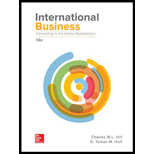
International Business: Competing in the Global Marketplace
12th Edition
ISBN: 9781259929441
Author: Charles W. L. Hill Dr, G. Tomas M. Hult
Publisher: McGraw-Hill Education
expand_more
expand_more
format_list_bulleted
Question
Chapter 4, Problem 4CTD
a)
Summary Introduction
To identify: Any hostile Religion I values for businesses.
b)
Summary Introduction
To explain: The experience in City KI teaching the relationship between Religion I and business.
c)
Summary Introduction
To explain: The implications of values of Religion I for a business to become a member of the union organization of Continent EE.
Expert Solution & Answer
Want to see the full answer?
Check out a sample textbook solution
Students have asked these similar questions
At the Ford automobile Highland plant,in 1913, how long did the average worker stay with the plant and what was the average tenure of a worker?
Question text
A company sells a product with an associated warranty. (The customer
must separately purchase the warranty at the time the related product
is purchased). After the sale of a particular warranty, the company
records the following journal entry:
Cash 500
Warranty Liability 500
What error now exists in the company’s financial statements?
Select one:
a.
Liabilities are understated.
b.
Liabilities are overstated.
C. Net income is understated.
d.
No error exists, as the entry has been properly recorded.
Indicate whether each of the following statements is true or false.
Bribery in the world of business typically happens when an organization or representative of an organization gives financial benefits to an official to gain favor or manipulate a business decision.
The Foreign Corrupt Practices Act was implemented in the aftermath of disclosures that businesses were violating the IMA Code of Ethics.
Managers are required to follow specific rules issued by the IMA for internal financial reporting.
Ethics is more than obeying laws.
The Sarbanes-Oxley Act addressed public company accounting reform.
Chapter 4 Solutions
International Business: Competing in the Global Marketplace
Knowledge Booster
Similar questions
- Suppose the following information was taken from the 2025 financial statements of pharmaceutical giant Merck & Co. (All dollar amounts are in millions.) Retained earnings, January 1, 2025 $46,600.0 Cost of goods sold 8,900.0 Selling and administrative expenses 8,100.0 Dividends 4,000.0 Sales revenue 35,800.0 Research and development expense 5,500.0 Income tax expense 2,300.0 After analyzing the data, prepare an income statement for the year ending December 31, 2025. (Enter amounts in millions rounded to 1 decimal place, e.g. 45.5 million.) MERCK AND CO. Income Statement (in millions) +A CA $arrow_forwardThe following items and amounts were taken from Sandhill Inc.'s 2025 income statement and balance sheet, the end of its first year of operations. Interest expense $2,100 Equipment, net $55,200 Interest payable 550 Depreciation expense 3,300 Notes payable 11,700 Supplies 4,300 Sales revenue 46,300 Common stock 24,800 Cash 2,400 Supplies expense 750 Salaries and wages expense 15,300 Prepare an income statement for Sandhill Inc. for December 31, 2025. Sandhill Inc. Income Statement S GA $ $arrow_forwardOrganization/Industry Rank Employer Survey Student Survey Career Service Director Survey Average Pay Deloitte & Touche/accounting 1 1 8 1 55 Ernst & Young/accounting 2 6 3 6 50 PricewaterhouseCoopers/accounting 3 22 5 2 50 KPMG/accounting 4 17 11 5 50 U.S. State Department/government 5 12 2 24 60 Goldman Sachs/investment banking 6 3 13 16 60 Teach for America/non-profit; government 7 24 6 7 35 Target/retail 8 19 18 3 45 JPMorgan/investment banking 9 13 12 17 60 IBM/technology 10 11 17 13 60 Accenture/consulting 11 5 38 15 60 General Mills/consumer products 12 3 33 28 60 Abbott Laboratories/health 13 2 44 36 55 Walt Disney/hospitality 14 60 1 8 40 Enterprise Rent-A-Car/transportation 15 28 51 4 35 General Electric/manufacturing 16 19 16 9 55 Phillip Morris/consumer products 17 8 50 19 55 Microsoft/technology 18 28 9 34 75 Prudential/insurance 19 9 55 37 50 Intel/technology 20 14 23 63 60 Aflac/insurance 21 9 55 62 50 Verizon…arrow_forward
- In 2012 XYZ Co. had sales of $74 billion and a net income of $23 billion, and its year-end total assets were $200 billion. The firm's total debt-to-total assets ratio was 45.3%. Based on the DuPont equation, what was XYZ Co.'s ROE in 2012? a) 22.97% b) 8.67% c) 25.62% d) 21.02% e) 14.01%arrow_forwardNonarrow_forwardI need help with this solution for accountingarrow_forward
- Compute the company's degree of opereting leverage?arrow_forwardWhich feature distinguishes nominal accounts from real accounts in closing entries? Options: (i) Temporary nature requiring closure (ii) Balance sheet presentation (iii) Permanent balances carried forward (iv) Contra account status financial Accounting problemarrow_forwardProvide correct solution accountingarrow_forward
arrow_back_ios
SEE MORE QUESTIONS
arrow_forward_ios
Recommended textbooks for you
 Understanding Management (MindTap Course List)ManagementISBN:9781305502215Author:Richard L. Daft, Dorothy MarcicPublisher:Cengage Learning
Understanding Management (MindTap Course List)ManagementISBN:9781305502215Author:Richard L. Daft, Dorothy MarcicPublisher:Cengage Learning Foundations of Business (MindTap Course List)MarketingISBN:9781337386920Author:William M. Pride, Robert J. Hughes, Jack R. KapoorPublisher:Cengage Learning
Foundations of Business (MindTap Course List)MarketingISBN:9781337386920Author:William M. Pride, Robert J. Hughes, Jack R. KapoorPublisher:Cengage Learning Management, Loose-Leaf VersionManagementISBN:9781305969308Author:Richard L. DaftPublisher:South-Western College PubMarketingMarketingISBN:9780357033791Author:Pride, William MPublisher:South Western Educational Publishing
Management, Loose-Leaf VersionManagementISBN:9781305969308Author:Richard L. DaftPublisher:South-Western College PubMarketingMarketingISBN:9780357033791Author:Pride, William MPublisher:South Western Educational Publishing


Understanding Management (MindTap Course List)
Management
ISBN:9781305502215
Author:Richard L. Daft, Dorothy Marcic
Publisher:Cengage Learning

Foundations of Business (MindTap Course List)
Marketing
ISBN:9781337386920
Author:William M. Pride, Robert J. Hughes, Jack R. Kapoor
Publisher:Cengage Learning

Management, Loose-Leaf Version
Management
ISBN:9781305969308
Author:Richard L. Daft
Publisher:South-Western College Pub

Marketing
Marketing
ISBN:9780357033791
Author:Pride, William M
Publisher:South Western Educational Publishing